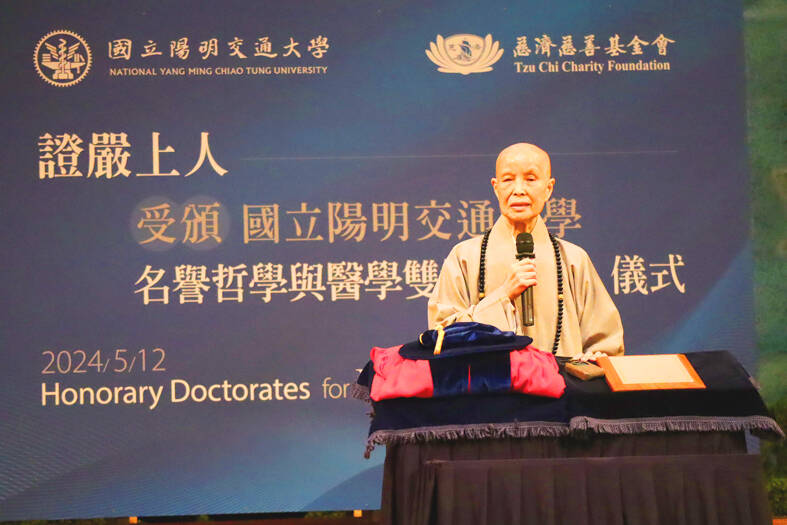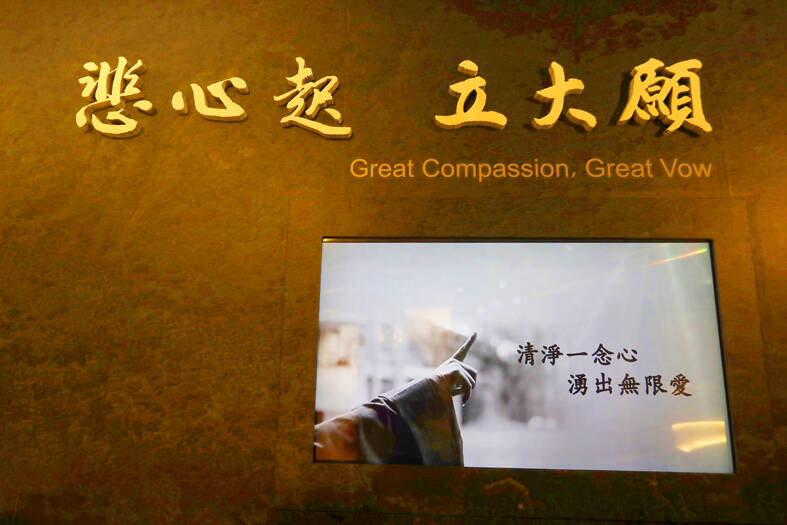The Buddhist teacher who founded what is now a global charity and religion with a US$283 million operating budget grew up at a time when women could not be ordained as Buddhist nuns.
What Cheng Yen (證嚴), now 87, started in 1966 in Taiwan’s eastern countryside as a grassroots effort among housewives has now burgeoned across 67 countries, including the US. The organization, named Buddhist Compassion Relief Tzu Chi Foundation, has mobilized 10 million volunteers who have helped build schools and hospitals, run programs for refugees in Ukraine and victims of mass shootings, and respond to natural disasters such as earthquakes, hurricanes and floods.
Cheng and about a dozen other nuns reside in the Jing Si Abode (靜思精舍) in Hualien County, the headquarters of Tzu Chi. The picturesque county — known for its majestic mountains that overlook the Pacific — gets its name from the “huilan,” a reference to the swirling currents of the Hualien River where it meets the Pacific Ocean.

Photo: CNA
What sets Cheng apart is that she is one of very few female Buddhist leaders in a strongly patriarchal faith tradition where ordination was barred for women — and still is in many countries.
“A female leader in our entire research of religious history is very, very different,” said Yao Yu-shuang (姚玉霜), a professor at Fo Guang University in Yilan County who has studied Buddhist movements.
Cheng, whose given name was Wong Chin-Yun (王錦雲), was born in 1937 to a relatively well-off family, but her parents gave her to her childless uncle’s family to raise. After her adoptive father died from a heart attack when she was 21, she ran away from home to become a nun.

Photo: Chiang Ying-ying, AP
Yao said getting ordained was an uphill task for her because in Taiwan and elsewhere in Asia at the time, being a monk was reserved for men.
That changed when Taiwan came under Japanese rule and women started receiving an education. Japan also allowed nuns to study at Buddhist universities in Japan, and when they came back to Taiwan, they established their own practices, formally opening the path to women being ordained.
Later, a chance meeting in Taipei with Yin Shun (印順法師) became a defining moment for Cheng. He accepted her as a disciple and formally ordain her.
Even though the Buddhist master’s base was in Hsinchu, and he spent little time with Cheng, the two developed a connection, said Tseng Guo-fang (曾國藩), a professor of anatomy at Tzu Chi University’s medical college.
During his final days, Yin Shun was cared for at Tzu Chi’s hospital.
During her time in Hualien, Cheng saw extensive poverty in the countryside. She wanted to help, but as a nun, she did not have her own source of income. She turned to local housewives, asking if they could spare coins, said Deng Su-qin, an early volunteer at Tzu Chi’s hospital.
Cheng saw how poverty was inextricably linked to lack of healthcare access as she helped families with loved ones who were sick and unable to work.
“I truly discovered that there were many people who fell ill because of their poverty, and even more people who were poor because they were sick,” said Cheng, recounting the hospital’s origin at a meeting with volunteers in 2007.
“Poverty and illness are like twins,” she said.
It took her eight years to build a full-service hospital in Hualien, then came the challenge of staffing it, because doctors and nurses did not want to live in the rural area. So she established a medical college, which serves as a feeder school for the hospital. Today, many of the hospital’s doctors and staff members come from Tzu Chi’s universities.
That focus on healthcare and decades of expertise led Tzu Chi to mobilize during the COVID-19 pandemic, and the Buddhist organization was able to purchase 5 million doses of BioNTech’s COVID-19 vaccine when the government could not.
Stephen Huang (黃思賢), executive director of Tzu Chi’s international operations based in southern California, called his teacher “an old soul” who experienced difficulties at a young age — losing her loved ones, running for cover as US military aircraft bombed Taiwan, then a Japanese colony, during World War II and seeing people around her struggle with poverty. He sees her as a bodhisattva — compassionate beings who put off their own enlightenment to help others.
“She is now 87, skinny and has a heart condition,” he said. “But she still wakes up at 4 in the morning and walks for two hours. She barely sleeps and eats. Her strength comes from her spirituality and loving compassion.”
Cheng’s followers view her as a wise, down-to-earth, empathetic leader with a sense of humor who likes to keep a low profile. She rarely gives interviews and declined to speak with The Associated Press as well.
While an aging Cheng continues to attend to her duties diligently, the organization’s followers are already planning to ensure her legacy endures. Huang said there is a plan for a core group of disciples to take the helm in the future — a daunting challenge for an organization that has for decades relied entirely on its charismatic leader for guidance.
“There is no one person ... who can replace Master Cheng Yen,” Huang said.

The Chinese military has built landing bridge ships designed to expand its amphibious options for a potential assault on Taiwan, but their combat effectiveness is limited due to their high vulnerability, a defense expert said in an analysis published on Monday. Shen Ming-shih (沈明室), a research fellow at the Institute for National Defense and Security Research, said that the deployment of such vessels as part of the Chinese People’s Liberation Army (PLA) Navy’s East Sea Fleet signals a strong focus on Taiwan. However, the ships are highly vulnerable to precision strikes, which means they could be destroyed before they achieve their intended

The first two F-16V Bock 70 jets purchased from the US are expected to arrive in Taiwan around Double Ten National Day, which is on Oct. 10, a military source said yesterday. Of the 66 F-16V Block 70 jets purchased from the US, the first completed production in March, the source said, adding that since then three jets have been produced per month. Although there were reports of engine defects, the issue has been resolved, they said. After the jets arrive in Taiwan, they must first pass testing by the air force before they would officially become Taiwan’s property, they said. The air force

GLOBAL: Although Matsu has limited capacity for large numbers of domestic tourists, it would be a great high-end destination for international travelers, an official said Lienchiang County’s (Matsu) unique landscape and Cold War history give it great potential to be marketed as a destination for international travelers, Tourism Administration Director General Chen Yu-hsiu (陳玉秀) said at the weekend. Tourism officials traveled to the outlying island for the Matsu Biennial, an art festival that started on Friday to celebrate Matsu’s culture, history and landscape. Travelers to Matsu, which lies about 190km northwest of Taipei, must fly or take the state-run New Taima passenger ship. However, flights are often canceled during fog season from April to June. Chen spoke about her vision to promote Matsu as a tourist attraction in

PAWSITIVE IMPACT: A shop owner said that while he adopted cats to take care of rodents, they have also attracted younger visitors who also buy his dried goods In Taipei’s Dadaocheng (大稻埕), cats lounging in shops along Dihua Street do more than nap amid the scent of dried seafood. Many have become beloved fixtures who double as photography models, attracting visitors and helping boost sales in one of the capital’s most historic quarters. A recent photo contest featuring more than a dozen shop cats drew more than 2,200 submissions, turning everyday cat-spotting into a friendly competition that attracted amateur and professional photographers. “It’s rare to see cats standing, so when it suddenly did, it felt like a lucky cat,” said Sabrina Hsu (徐淳蔚), who won the NT$10,000 top prize in